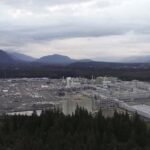In the frigid waters of British Columbia’s northwest coast, a controversy is brewing that could shape Canada’s climate future for decades to come. The massive LNG Canada project, backed by Royal Dutch Shell and several Asian energy giants, has emerged as what former Bank of Canada governor Mark Carney calls “the single largest carbon bomb” on the horizon in Canadian energy development.
The $40 billion liquefied natural gas export facility under construction in Kitimat represents a stark contradiction in Canada’s climate commitments. While Prime Minister Justin Trudeau’s government has pledged to reduce national greenhouse gas emissions by 40-45% below 2005 levels by 2030, this single project could release up to 8.6 megatonnes of carbon dioxide equivalent annually during its first phase alone—roughly equal to emissions from 1.7 million passenger vehicles.
“What we’re witnessing is a fundamental disconnect between Canada’s climate rhetoric and its project approvals,” said Dr. Kathryn Harrison, political scientist and climate policy expert at the University of British Columbia. “The mathematics simply doesn’t add up when we examine how projects like LNG Canada fit within our Paris Agreement obligations.”
The project’s defenders, including the B.C. provincial government, argue that Canadian LNG will help Asian countries transition away from coal, potentially creating a net global emissions benefit. Industry representatives point to technologies like electric drive turbines that they claim make this facility cleaner than comparable operations worldwide.
However, these assertions face intense scrutiny from climate scientists who highlight the methane leakage throughout the natural gas supply chain. Recent studies from the David Suzuki Foundation documented methane emissions from B.C.’s gas fields that were 1.5 to 2.5 times higher than industry-reported figures.
“When you account for the full lifecycle emissions, including extraction, processing, transport and eventual combustion, the climate benefits compared to coal diminish substantially,” explained Dr. James Drummond, atmospheric scientist at Dalhousie University.
Indigenous communities find themselves divided over the project. While elected councils from several First Nations along the pipeline route have signed benefits agreements worth millions, hereditary chiefs from the Wet’suwet’en Nation have led fierce resistance against the Coastal GasLink pipeline feeding the facility.
“This isn’t just about money,” said Molly Wickham, a spokesperson for the Gidimt’en clan of the Wet’suwet’en. “This is about our sacred responsibility to protect the land and water for future generations. The Canadian government talks about reconciliation while permitting projects that violate our sovereignty.”
The project also faces economic headwinds. With global LNG prices fluctuating dramatically and other countries racing to develop export capacity, the long-term profitability remains uncertain. Financial analysts have questioned whether facilities with 40-year operational lifespans make sense in a world increasingly transitioning away from fossil fuels.
As construction continues at the Kitimat site, environmental organizations have filed multiple legal challenges, arguing that federal approval processes failed to adequately assess cumulative climate impacts. Meanwhile, protests have intensified both at construction sites and in urban centers across Canada.
The LNG Canada controversy represents a pivotal moment in Canada’s energy and climate policy. As the project progresses toward its planned 2025 completion date, Canadians must grapple with a difficult question: Can a country genuinely claim climate leadership while developing infrastructure that locks in decades of new fossil fuel emissions?























